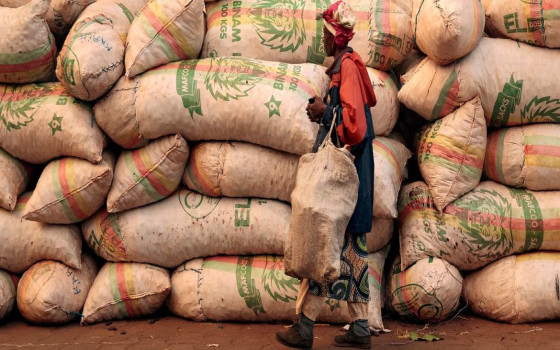
United Nations: Highly indebted developing countries are facing years of economic problems caused by slowing global growth and declining investment

- Europe and Arabs
- Thursday , 13 April 2023 15:2 PM GMT
Brussels: Europe and the Arabs
The United Nations Conference on Trade and Development (UNCTAD) has warned that heavily indebted developing countries are facing years of economic problems stemming from slowing global growth, high interest rates and low investment. At the same time, it was announced that the economic growth rate was declining in all regions of the world, according to what was stated in the United Nations bulletin, which it distributed via e-mail, and we received a copy of it.
In a new report released on Wednesday, UNCTAD expected annual growth across large parts of the global economy this year to be below pre-pandemic levels. The UN agency stressed that high interest rates combined with high levels of debt will add to the "crushing" impact on developing countries in the coming years, which "will further exacerbate the cost-of-living crisis that their citizens are currently facing and will increase inequality around the world." Debt distress slows down development According to UNCTAD, rising interest rates "will cost developing countries more than $800 billion in lost income over the coming years," while debt servicing costs are rising at the expense of investment and public spending. Borrowing costs, as measured by sovereign bond yields, rose from 5.3 percent to 8.5 percent in 68 developing markets in 2022. The report said debt servicing costs have consistently outpaced public spending on basic services over the past decade, and that "the number of countries spending more on servicing external public debt than on health care increased from 34 to 62 over the period." Last year, UN Deputy Secretary-General Amina Mohammed warned of this dynamic, describing it as "a trade-off between investments in debt and investments in people". Public investment in developing countries is expected to continue to suffer, as countries pay out more to their external creditors than they take in new loans. According to UNCTAD, this will be the case for 39 countries in 2022, with dire consequences for development, social protection and the fight against inequalities more broadly. Liquidity crisis Meanwhile, international liquidity from developing economies is drying up. According to the report, all 81 developing countries, with the exception of China, lost $241 billion in international reserves in 2022, representing seven percent on average. More than 20 countries have seen their reserves drop by more than 10 percent, UNCTAD said, "and in many cases the recent addition of SDRs has been depleted." Special Drawing Rights are international reserve assets established by the International Monetary Fund to supplement member countries' official foreign exchange reserves and help provide them with liquidity. The International Monetary Fund implemented the largest ever allocation of Special Drawing Rights, at $650 billion, in August 2021 to support countries through the economic crisis due to the COVID-19 pandemic. Amid a liquidity shortage, UNCTAD warned that the 500 million people living in 37 countries could continue to suffer "for years to come from the consequences of a global financial system that is unable to respond with the scale and speed needed to address the systemic shocks affecting the developing world." The cost of living crisis The report highlights that food price inflation will continue to be rampant in developing countries in early 2023, contributing to the high cost of living. This reflects the latest assessment by the Food and Agriculture Organization of the United Nations (FAO), which said that although food prices around the world have fallen for 12 consecutive months, prices are still 30 percent higher today than the average level recorded in 2020, and many countries are struggling. Low- and middle-income food price inflation exceeds ten percent. According to FAO Chief Economist Maximo Torero, high food prices are putting food security at risk, "particularly in food-importing developing countries, with the situation exacerbated by the depreciation of their currencies against the US dollar or the euro and the growing debt burden." UNCTAD also warned that high interest rates and inflated food and energy prices will continue to dampen household spending and business investment. Debt restructuring UNCTAD said that urgent focus should be placed on reforming the global debt structure to adequately meet the needs of developing countries. Among the organization's recommendations are the establishment of a multilateral "debt resolution mechanism", a registry of validated data on debt transactions from both lenders and borrowers, and improved debt sustainability analyzes that take into account development needs and climate finance. Enhance development financing The recommendations echo UN Secretary-General António Guterres' call earlier this year for action to reduce the rising cost of debt and expand long-term financing for development. Last February, Mr. Guterres proposed an annual stimulus package to bridge the "significant financial gap" between developed and developing countries and help achieve the Sustainable Development Goals by 2030. The "SDG Catalyst" proposal also called for the expansion of emergency financing to countries in need and the automatic issuance of special drawing rights in times of crisis. New Special Drawing Rights The UNCTAD report said that the issuance of new SDRs "worth at least $650 billion" would be a "positive first step in helping to relieve heavy debt burdens" that put development at risk. The organization said that this report is part of its contribution to the international discussions currently taking place in the American capital, Washington, during the meetings of the International Monetary Fund / World Bank, including on debt and financing. The United Nations Conference on Trade and Development considered these meetings a "valuable opportunity" to enhance development financing and improve liquidity prospects












No Comments Found